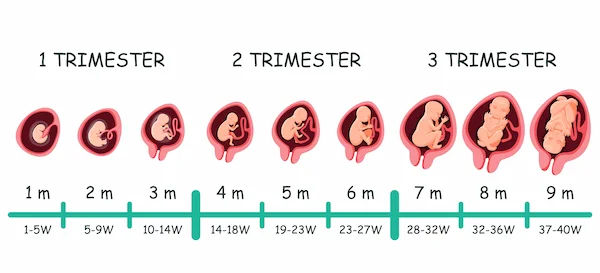Guide to Low Bp During Pregnancy
Know about the management of low blood pressure, what it is, low bp versus high bp, low bp in pregnancy, symptoms of low bp, potential risks and lifestyle modifications for achieving normal bp.


Introduction
Pregnancy is a journey of incredible physical transformation, and your cardiovascular system is at the heart of it all, literally. This dip in blood pressure is typically a normal physiological response as your body works overtime to support your growing baby. It's caused by hormonal shifts and an expanding network of blood vessels. However, navigating the symptoms like dizziness, fatigue, and occasional lightheadedness can be challenging. This comprehensive guide will walk you through everything you need to know: from what's considered a low BP reading and why it happens, to practical, safe strategies for managing symptoms at home and understanding when it's crucial to consult your doctor.
What is Considered Low Blood Pressure in Pregnancy?
Blood pressure is measured with two numbers: systolic (pressure when the heart beats) over diastolic (pressure when the heart rests). A normal, healthy reading for a non-pregnant adult is around 120/80 mmHg.
Normal vs. Low BP Ranges
During pregnancy, it's common and expected for blood pressure to decrease slightly from your pre-pregnancy baseline. There isn't a single universal number that defines low blood pressure (hypotension) for every pregnant woman, as it depends on your individual normal. However, doctors often start to pay attention if readings consistently fall at or below 90 mmHg systolic or 60 mmHg diastolic (90/60). The most significant drop typically occurs in the middle of your pregnancy, during the second trimester, and often stabilises or rises again later on. The key isn't just the number itself, but how you are feeling. If your readings are low but you have no symptoms, your doctor may simply monitor them.
Consult a Cardiologist for Personalised Advice
Why Does Blood Pressure Drop During Pregnancy?
This natural dip isn't a flaw; it's a feature of a well-adapted pregnant body. Understanding the "why" can help alleviate unnecessary worry.
The Role of Hormones (Progesterone)
The pregnancy hormone progesterone is a primary culprit—and a beneficial one. It causes your blood vessel walls to relax and dilate (widen). This vasodilation reduces resistance within your vessels, allowing blood to flow more easily to your uterus and baby, but consequently lowering your overall blood pressure.
The Cardiovascular System's Expansion
Your body is creating an entirely new circulation system for your baby. To support this, your blood volume increases by nearly 50% by the time you reach full term. Your heart is pumping this larger volume through wider, more relaxed vessels, which can manifest as lower pressure, especially when you change positions quickly.
Other Contributing Factors
While physiology is the main cause, other elements can exacerbate the issue.
Dehydration
Pregnancy increases your fluid needs. Even mild dehydration can reduce blood volume, causing a noticeable drop in pressure.
Anemia
A common pregnancy condition where you have a low red blood cell count. With fewer cells to carry oxygen, managing circulation becomes harder, potentially worsening hypotension.
A simple blood test, which can be conveniently done via home collection services by Apollo24|7, can diagnose anaemia.
Prolonged Bed Rest
While sometimes medically necessary, long periods of inactivity can reduce circulation and contribute to lower blood pressure.
Common Symptoms of Low BP in Pregnant Women
Recognising the signs helps you take proactive steps to stay safe.
Dizziness and Lightheadedness
This is the hallmark symptom, often occurring when standing up too quickly from a sitting or lying position, a specific
type of low BP called orthostatic hypotension. It happens because gravity causes blood to pool in your legs momentarily before your circulatory system can compensate.
Nausea and "Shakiness"
Insufficient blood flow to the brain can sometimes trigger feelings of nausea or a general sense of unwellness and shakiness, often mistaken for hunger or low blood sugar.
Fainting (Syncope)
In more severe cases, a significant drop in blood pressure can lead to a temporary loss of consciousness. Fainting is your body's way of forcing you to lie down, making it easier for blood to reach your brain. This is a clear sign that your body needs you to slow down and manage your symptoms more diligently.
Potential Risks and Complications
For most women, low blood pressure during pregnancy is manageable and not considered dangerous. However, understanding the potential risks is important.
Risks for the Mother (Falls and Injuries)
The primary risk is from accidents caused by symptoms. A sudden dizzy spell or fainting episode can lead to a fall, potentially resulting in injuries like fractures, sprains, or head trauma. This is why managing dizziness is a crucial safety measure.
Potential Impact on the Baby
Significant, persistent, and untreated hypotension could potentially reduce blood flow to the placenta (placental hypoperfusion), which in rare cases might lead to issues like low birth weight or oxygen deprivation. It's important to stress that this is uncommon, and most cases of physiological low BP do not lead to these outcomes. Regular prenatal check-ups are designed to monitor your baby's growth and well-being and catch any potential problems early.
How to Manage and Treat Low Blood Pressure at Home
Most management strategies are simple, safe, and highly effective lifestyle adjustments.
Dietary Adjustments for Low BP
- Stay Salty: Contrary to general health advice, if you have low BP, your doctor may suggest a moderate increase in salt intake. Always consult your doctor before making this change, especially to rule out any contraindications.
- Small, Frequent Meals: Instead of three large meals, eat smaller meals throughout the day. Large meals can divert blood to your digestive tract, exacerbating dizziness.
- Stay Hydrated: This is non-negotiable. Drink plenty of water throughout the day. Electrolyte-rich fluids like coconut water or oral rehydration solutions can also be beneficial.
Lifestyle and Positional Changes
It includes:
- Rise Slowly: The "slow-motion" rule is your best friend. When getting out of bed, sit on the edge for a minute before standing up. Do the same when rising from a chair.
- Avoid Standing Still: If you must stand for a period, shift your weight from one foot to the other or walk in place to keep blood circulating.
- Compression Stockings: These stockings apply gentle pressure to your legs and feet, helping to prevent blood from pooling there and improving overall circulation.
- Rest on Your Side: Lying on your left side is ideal as it maximises blood flow to your heart—and therefore to your brain and your baby.
When to Seek Medical Help for Pregnancy Hypotension
While often normal, certain signs warrant immediate medical attention. Consult a doctor online with Apollo24|7 for further evaluation if you experience:
- Frequent fainting spells.
- Dizziness that is severe, persistent, or interferes with your daily life.
- Chest pain or palpitations (a racing or irregular heartbeat).
- Blurred vision that doesn't resolve quickly.
- Symptoms of anaemia like extreme fatigue, pale skin, or shortness of breath.
These could be signs that your low blood pressure is symptomatic of another underlying issue that needs professional diagnosis and treatment.
Low BP vs. High BP: Knowing the Difference
It's crucial to distinguish between the two. High blood pressure (hypertension), particularly when accompanied by protein in the urine after 20 weeks, is known as preeclampsia. This is a serious medical condition that requires close medical supervision, as it can affect your organs and be dangerous for both mother and baby. Low blood pressure, while uncomfortable, is typically not medically urgent in the same way. However, any sudden, extreme changes in your blood pressure readings, whether high or low, should always be discussed with your healthcare provider.
Conclusion
Experiencing low blood pressure during pregnancy is a standard part of the journey for many women, a testament to your body's amazing ability to adapt and nurture new life. While the dizzy spells and fatigue can be unsettling, they are usually manageable with simple, mindful practices. By understanding the causes, recognising the symptoms, and implementing the strategies outlined in this guide, you can significantly improve your comfort and safety. Remember, you are not alone in this. Your prenatal care team is your greatest resource. Keep them informed of your symptoms, attend all your appointments, and never hesitate to reach out with concerns.
Consult a Cardiologist for Personalised Advice
Consult a Cardiologist for Personalised Advice

Dr. Zulkarnain
General Physician
2 Years • MBBS, PGDM, FFM
Bengaluru
PRESTIGE SHANTHINIKETAN - SOCIETY CLINIC, Bengaluru

Dr. Anand Ravi
General Physician
2 Years • MBBS
Bengaluru
PRESTIGE SHANTHINIKETAN - SOCIETY CLINIC, Bengaluru

Dr. Tripti Deb
Cardiologist
40 Years • MBBS, MD, DM, FACC, FESC
Hyderabad
Apollo Hospitals Jubilee Hills, Hyderabad

Dr. Sumanjita Bora
Cardiologist
9 Years • MBBS, PGDCC
Bengaluru
Apollo Clinic, Sarjapur Road, Bengaluru
Dr. Raghu T R
Cardiologist
30 Years • MD, DM. Cardio, FACC.
Bengaluru
SJICR Hospital, APOLLO SPECIALITY HOSPITAL JAYANAGAR, Bengaluru
Consult a Cardiologist for Personalised Advice

Dr. Zulkarnain
General Physician
2 Years • MBBS, PGDM, FFM
Bengaluru
PRESTIGE SHANTHINIKETAN - SOCIETY CLINIC, Bengaluru

Dr. Anand Ravi
General Physician
2 Years • MBBS
Bengaluru
PRESTIGE SHANTHINIKETAN - SOCIETY CLINIC, Bengaluru

Dr. Tripti Deb
Cardiologist
40 Years • MBBS, MD, DM, FACC, FESC
Hyderabad
Apollo Hospitals Jubilee Hills, Hyderabad

Dr. Sumanjita Bora
Cardiologist
9 Years • MBBS, PGDCC
Bengaluru
Apollo Clinic, Sarjapur Road, Bengaluru
Dr. Raghu T R
Cardiologist
30 Years • MD, DM. Cardio, FACC.
Bengaluru
SJICR Hospital, APOLLO SPECIALITY HOSPITAL JAYANAGAR, Bengaluru
More articles from pregnancy
Frequently Asked Questions
1. Is low blood pressure a sign of pregnancy?
While not a definitive diagnostic sign, a sudden, unexplained drop in blood pressure can be an early indicator for some women, thanks to the rapid hormonal changes that occur immediately after conception.
2. Can low blood pressure cause a miscarriage?
There is no direct medical evidence linking normal physiological low blood pressure to an increased risk of miscarriage. The body's adaptation to support pregnancy often includes this blood pressure dip.
3. What is the best drink for low blood pressure during pregnancy?
Water is essential. For an extra boost, electrolyte-rich drinks like coconut water, oral rehydration solutions, or even a simple lemon water with a pinch of salt (after consulting your doctor) can help maintain blood volume and pressure.
4. Does low blood pressure mean a boy or a girl?
This is an old wives' tale with no scientific basis. The changes in your blood pressure are governed by physiology and hormones, not by the sex of your baby.
5. How can I quickly raise my blood pressure when I feel dizzy?
If you feel a dizzy spell coming on, sit down immediately and lower your head between your knees, or lie down on your left side. This encourages blood flow to your brain. Drink a glass of water and avoid sudden movements.




_1.webp)